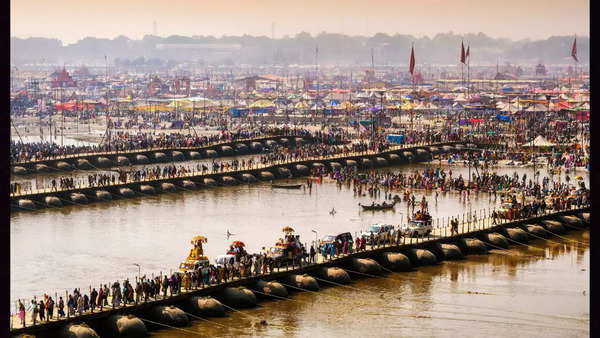
Mahakumbh, a celebration of spirituality, religion, equality, and all things holy, has started today in Prayagraj, India. The grand Mahakumbh which is hosting people of all faiths, classes, countries, and diversity, only has one motto – Bringing the world together in spirituality.
The Mahakumbh Mela, held once every 12 years, takes place in rotation at four sacred locations – Prayagraj, Haridwar, Ujjain, and Nashik. And the location of the Kumbh mela is decided according to the specific planetary alignments.
The story behind Kumbh

One of the most well-known and famous origins of the Kumbh is believed to be linked to the Samudra manthan era, the churning of the ocean that brought forth a pot (Kumbh) of Amrit.
It is said that when the pot of Amrit was being taken away from the Asuras, the drops spilled in 4 different locations around India, and these 4 locations became the epicentres of holiness and positivity. And eventually, they became the spaces where Kumbh mela was held to help the ordinary living beings experience the divine like no place else.
It is also believed that overtime, according to people’s wishes, the Kumbh came to be of different types, happening annually, once in 6 years, once in 12 years, and also, once in 144 years.
The types of Kumbh
One of the most famous types of Kumbh is the Magh mela, that is held ever year, and so is an annual fair that attracts people from all over India. It has the everyday, simple ritual bathing, the Ganga snan, the fairs and rides that are classic to Melas, and the likes.
Then comes the Ardh Kumbh, once every 6 years, and is a little more famous than the Magh melas. As the Ardh kumbh happens only once in 6 years, people await the dates and the Ardh Kumbh of 2019 was a grand sight to say the least.
Next up comes the Purna kumbh, once every 12 years, and was last celebrated in 2013. This Purna kumbh was also termed as a Mahakumbh and witnessed massive crowds all over India and in Prayagraj, the host city.
And the biggest of all is the Mahakumbh, believed to come only once every 144 years, and after the completion of 12 Purna Kumbhs. It is one of the most powerful, auspicious and holy collectives in decades.
The ‘Kalpavas’ in Mahakumbh
During the Kumbh Mela, some of the most sincere devotees stay in spiritual retreats that are known as Kalpavas. Kalpavasis, as these devotees are called, live for the whole 40-44 days in the Mela, and live a disciplined and minimalistic life.
The Kalpavasis are expected to wake up early, take a dip in the Triveni Sangam, and spend the day with their Gurus, meditating, reciting scriptures, and performing rituals. They are also supposed to eat simple, Sattvic meals that are made for all the devotees, and keep away from the material luxuries of life.
The Shahi snan of Mahakumbh
The Shahi Snan, or royal bath, is the highlight of the Kumbh Mela. This ritual bath in the sacred rivers is considered the most powerful and liberating experience for a human, and the days of the Shahi snan are one of the most pure and positive to perform Sadhna.
The Akharas in Kumbh mela
In 2025, the Shahi snan will be done on 6 different dates starting from January 14, the day of Makar Sankranti. And this Shahi Snan begins with a grand procession of Akharas and the first dip in the Triveni Sangam is reserved for the Sadhus and saints and Nagas of these orders.
In many events, the Naga sadhus, known for their austere lifestyle, lead the procession, and make way for the devotees to start their ritual bathing.
The link with Paush Purnima
If you go back in time, there is a certain link between Mahakumbh mela and Paush Purnima. And that is that the Kumbh Mela officially begins on the day of Paush Purnima, the full moon day in the Hindu month of Paush. Be it the Mahakumbh of 2025, or the Kumbh mela of 2013, both of them start with the Paush Purnima days.
According to many elders and experts, the alignment of celestial bodies on the day of Paush Purnima improves the spiritual energies of the rituals that are performed. Many devotees begin their Kalpavas on the day of Paush Purnima, committing to a month-long retreat.
The Mahamandaleshwar of the ceremony
Every Akhara has a Mahamandleshwar who is given the responsibility to initiate people, lead the rituals and practices, and more in the Kumbh melas. There are different Mahamandaleshwar in different Akharas, from the Juna akhara to the Kinnar akhara, and they teach people the ways of life, living in community, and more.
This year, one of the first foreign and female Mahamandleshwar is also gracing the Mahakumbh. Yogmata Keiko Aikawa has come all the way from Japan to attend the Mahakumbh and further her teachings.
Another famous person in the list this year is Laurene Powell, wife of Steve Jobs, who has decided to become a Kalpavasi in Mahakumbh this year. She has been given the name of Kamala for the rituals and pujas, and has been given a Gotra, as confirmed by Swami Kailashanand Giri.





